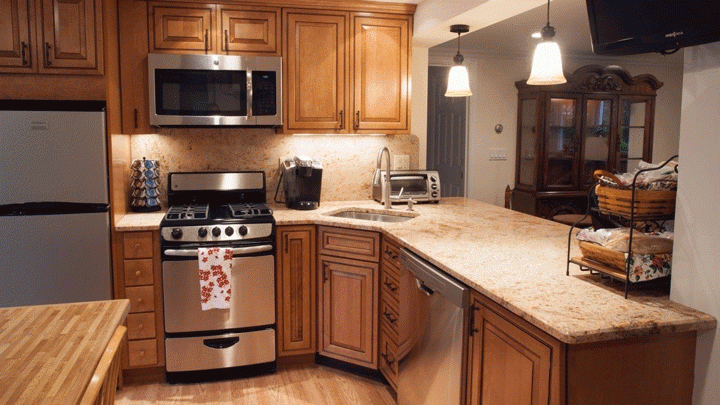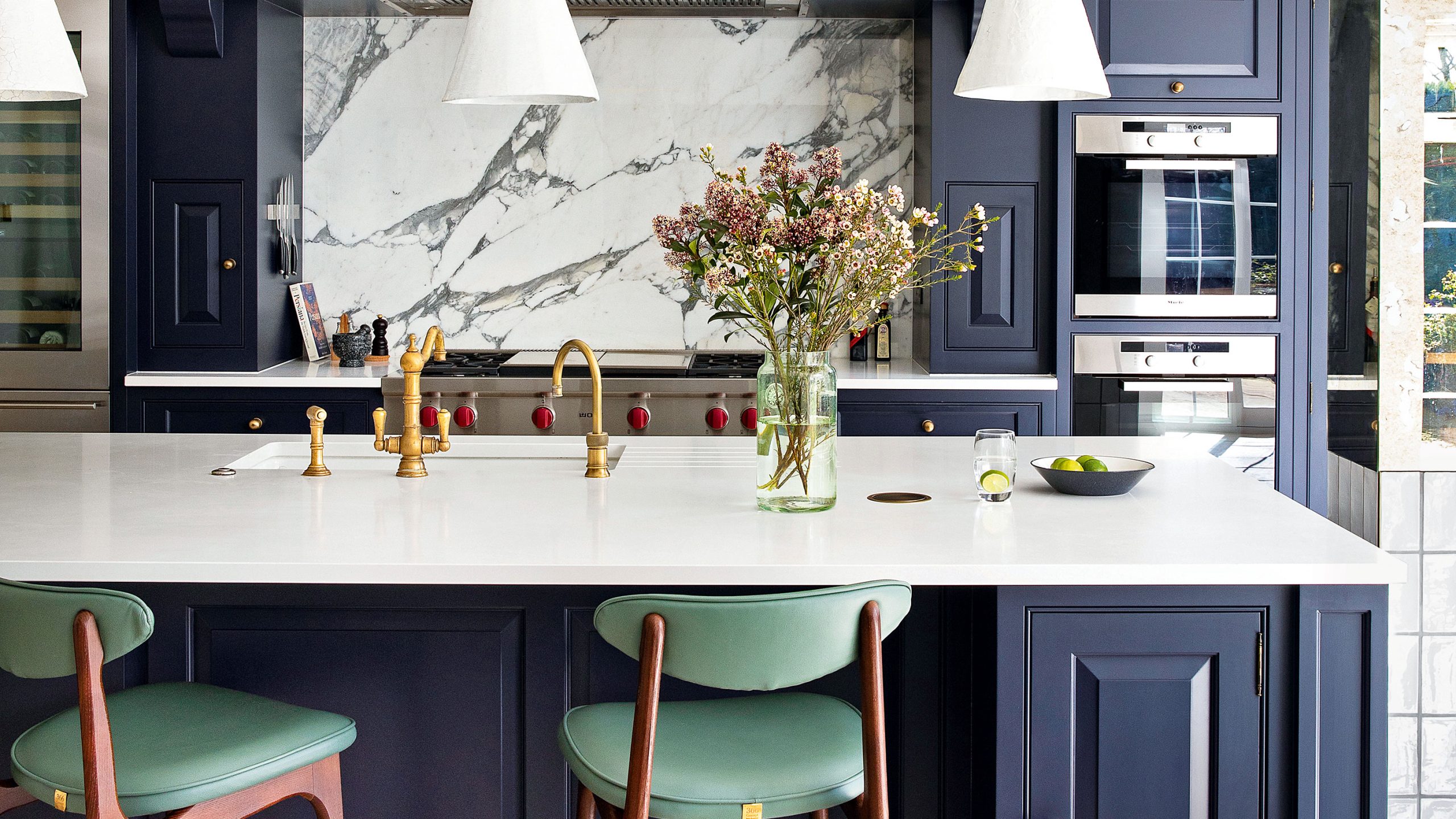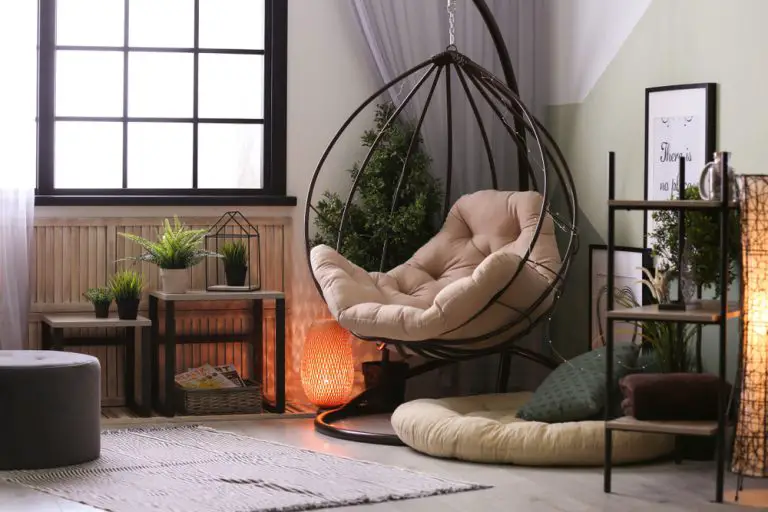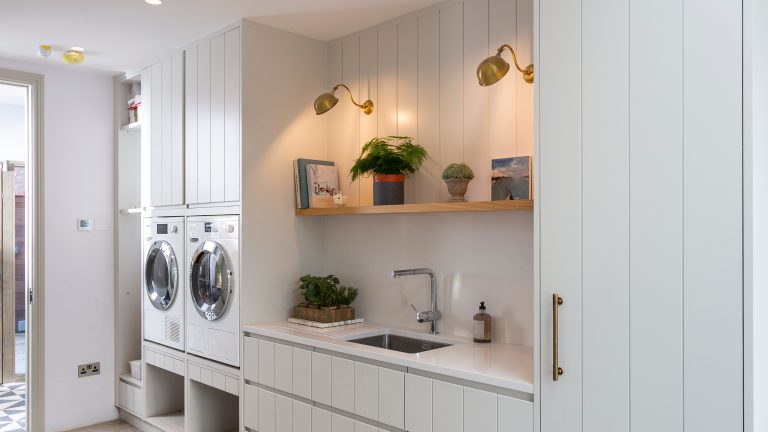Should Kitchen Countertops Be Lighter Or Darker?
When it comes to kitchen countertops, there is no one-size-fits-all answer. Whether you should go with lighter or darker countertops depends on a variety of factors, including the size of your kitchen, the overall design style, and your personal preference. Lighter countertops are great for smaller kitchens as they can make a space look larger, while darker countertops add a sense of depth and sophistication. For a classic look, consider a neutral shade like gray or white, and for a bolder look, go for a dark, deep color like navy or black. Ultimately, the decision is yours to make, but it’s important to consider all the options before making a final decision.
Advantages of Light Countertops
When deciding whether or not to go with lighter or darker kitchen countertops, it’s important to consider the advantages of each option. Light countertops can be a great choice for a few reasons. For starters, they can make a smaller kitchen feel larger and brighter. This is because of the way light reflects off of them, creating a sense of space and openness. Since they are generally less expensive than darker countertops, they can also be a good cost-saving measure. Light countertops are also easier to keep clean than darker ones since dirt and grime are less visible. Additionally, they can provide a neutral, calming backdrop for other design elements in the kitchen. Ultimately, the decision between lighter and darker countertops comes down to personal preference and budget, but lighter countertops offer a few advantages.
Disadvantages of Light Countertops
When it comes to kitchen countertops, there is no one-size-fits-all solution. Depending on your lifestyle, budget, and personal preferences, the choice of which color to go with can be a difficult one. While light countertops can offer a modern, airy feel to a kitchen, there are several potential drawbacks to consider before committing to a lighter color.
One of the most common disadvantages of light countertops is that they show scratches and marks much more easily than darker countertops. Over time, these marks and scratches can add up and detract from the aesthetic of your kitchen. Light countertops can also show dirt and grease more easily, which can lead to more frequent cleaning and maintenance. They are also more prone to staining as they absorb more liquids and oils.
Light countertops tend to require more upkeep than darker ones, and materials such as granite and marble can be more expensive than other materials, making them a less economical option. In addition, depending on the type of countertop material chosen, a light countertop can lack durability and be prone to chipping, cracking, or fading.
When it comes to deciding between a lighter or darker countertop, it is important to weigh the pros and cons of each to determine which is the best fit for your lifestyle and preferences.
Advantages of Dark Countertops
When it comes to kitchen countertop color choices, there are pros and cons to both lighter and darker shades. Darker countertops offer a bold, modern look that is sure to bring a unique style to your kitchen. Not only are they aesthetically pleasing, but they also offer several advantages that lighter countertops do not.
Darker countertops are ideal for busy kitchens that see a lot of traffic. The darkness of the color masks any potential scratches and other wear and tear that tend to occur over time. This makes dark countertops a great choice for those who plan on using their kitchen countertops heavily.
In addition, darker countertops are easier to clean than lighter countertops because they do not show dirt and grime as easily. This makes them ideal for those who want a low-maintenance option. Lastly, darker countertops can make a kitchen appear larger and more spacious, while lighter countertops can make a space look smaller.
For those considering a darker countertop, there are many options to choose from, including granite, quartz, and other types of stone. Each of these offers its unique benefits, so it is important to take the time to research each option to determine which one is best for your particular kitchen.
When it comes to choosing the right color for your kitchen countertops, darker shades should be strongly considered. Not only do they provide a modern, stylish look, but they are also more durable and easier to clean, making them a great choice for busy households.
Disadvantages of Dark Countertops
Dark countertops may look chic and sleek but they do have some drawbacks. They can make a kitchen look smaller than it is, as dark colors tend to absorb light, making the space feel dim and cramped. Additionally, dark colors can make a kitchen appear outdated and can be hard to match with other elements in the kitchen. Dark countertops also tend to show fingerprints and smudges more easily, which can give a kitchen an unclean appearance. Furthermore, dark countertops are more prone to staining from acidic foods and beverages and may be harder to keep clean. While dark countertops can make a statement in a kitchen, they may not be the best choice for all homeowners. It is best to consider all of the pros and cons before deciding which type of countertop is best for your space.

Pros & Cons of Different Countertop Materials
Kitchen countertops can be an important decision for any kitchen remodel. When it comes to the color, the choice can be even more difficult. Should the countertop be lighter or darker? There are pros and cons to both options. The material used for the countertop can also make a difference.
Natural stone countertops such as granite and marble offer a variety of colors. Lighter natural stone countertops such as white marble can give a room a bright and airy feel, while darker options such as black granite can create a dramatic and luxurious look. Natural stone countertops are also very durable and can last for decades.
Laminate countertops come in a variety of colors and patterns and can be used to create either a light or dark look. Laminate countertops are less expensive than natural stone, making them a great option for those on a budget. Laminate countertops are also easy to clean and maintain, making them a popular choice.
Quartz countertops are a popular choice for those who want a durable countertop with a variety of colors. Quartz countertops come in many different shades, from light to dark. Quartz countertops are also more resistant to scratches and stains, making them a great choice for busy households.
Finally, solid-surface countertops are a great option for those looking for a minimalist look. Solid-surface countertops come in a variety of colors and can be used to create either a light or dark look. Solid-surface countertops are also easy to clean and maintain.
When choosing a countertop, consider all the pros and cons of each material and color. With the right countertop, you can create the perfect kitchen for your home.
Factors to Consider When Choosing Countertop Color
When it comes to choosing a countertop color for your kitchen, the options can seem endless. While it’s ultimately a personal decision, there are some factors to consider that can help narrow down your choices. Do you want a lighter or darker countertop? Should it match the cabinetry, or should it contrast? Will it be easier to maintain a lighter or darker countertop?
First, consider the size and shape of your kitchen. If it’s a small space, a lighter color will brighten it up and make the room appear larger. Conversely, a darker countertop can be overwhelming in a small kitchen. But if you have a large kitchen, a darker color can make it feel more intimate and cozy.
Next, decide if you want to match or contrast the cabinetry. If you have light wood cabinets, a lighter countertop will create a more unified look. But if you have dark cabinets, a lighter countertop could help to brighten the space and create contrast.
Finally, factor in ease of maintenance. Lighter colors are typically easier to maintain since they don’t show dirt and stains as easily as darker colors. But darker colors are more resistant to scratches and chips.
Ultimately, there is no right or wrong answer when it comes to choosing between lighter or darker countertops for your kitchen. Consider the size and shape of the room, along with the cabinetry, and then decide which color will be easier to maintain. Once you’ve done that, you can choose the perfect shade for your kitchen countertops.
Tips for Choosing the Right Countertop Color
Choosing the right countertop color for your kitchen can be a difficult decision. Do you opt for a lighter color that will give the room an airy, spacious feel? Or do you go for a darker color that will create a warm, cozy atmosphere? There is no right or wrong answer here, as the decision will depend on your tastes and preferences. However, there are some tips you can follow to help you make the best choice for your kitchen.
First, consider the other colors in the room. If you have a lot of lighter colors, such as white cabinets or light wood floors, a darker countertop may help to balance out the room. On the other hand, if your kitchen is darker, a lighter countertop may help to brighten it up.
Second, consider the amount of natural light in the room. If your kitchen receives a lot of natural light, a darker countertop will help to absorb some of the light and make the room feel cozier. However, if your kitchen is darker and receives little natural light, a lighter countertop may be the better option.
Finally, think about how you plan to use the countertop. Will it be used mainly for food preparation, or will you be using it as a display area for dishes and other items? If you plan to use it mainly for food preparation, a darker countertop may be better as it is easier to see spills and other messes. If you plan to use it as a display area, a lighter countertop may be better as it will show off the items on the countertop more easily.
Ultimately, the choice of whether to go for a lighter or darker countertop in your kitchen is up to you. By considering the other colors in the room, the amount of natural light, and how you plan to use the countertop, you can make an informed decision and choose the countertop color that best suits your needs.
Aesthetics of Light vs
Dark Countertops
When it comes to choosing the right kitchen countertops, the color can make all the difference. The two most popular options are lighter and darker countertops, and each has its own set of advantages and disadvantages. For instance, lighter countertops can help make a space feel larger and brighter, while darker countertops can help create a more dramatic feel. On the other hand, lighter countertops may require more maintenance and may not be as durable as darker countertops. Ultimately, it depends on your individual needs and preferences.
When considering the aesthetics of kitchen countertops, both lighter and darker countertops have their unique charm. Lighter countertops can help to create a more open, airy feel to a kitchen, while darker countertops can give the space a more sophisticated and contemporary look. Additionally, lighter countertops can help to emphasize the existing color palette in a room, while darker countertops can create a stunning contrast.
Whether you choose a lighter or darker countertop for your kitchen, it’s important to consider both the aesthetic and practical elements of the decision. Both lighter and darker countertops can bring a unique sense of style and personality to the space, but it’s important to make sure the countertops are both practical and aesthetically pleasing. Consider the overall look of your kitchen, the available natural and artificial light, and the countertop material, and make sure to choose the color that best suits your needs.
FAQs About the Should Kitchen Countertops Be Lighter Or Darker?
1. What are the benefits of having lighter or darker kitchen countertops?
Lighter countertops can make a kitchen appear larger, airier, and brighter, while darker countertops can add warmth and depth to a kitchen.
2. Are there any special considerations for selecting a kitchen countertop color?
Yes, it is important to consider the size of the kitchen and the overall color scheme of the room when selecting a kitchen countertop color. A lighter color may be best suited for a smaller kitchen, while a darker color may be better suited for a larger kitchen.
3. Is there a risk of the kitchen countertop color fading over time?
Yes, kitchen countertop colors can fade over time due to exposure to sunlight, heat, and cleaning products. It is important to select a countertop material that is designed to be durable and resistant to fading.
Conclusion
The choice of a kitchen countertop should be based on personal preference, as there is no definitive answer as to whether a countertop should be lighter or darker. Darker countertops may be more attractive and easier to clean, while lighter countertops can brighten up the space and make it appear larger. Ultimately, the decision should be based on the overall look and feel of the kitchen, as well as the individual’s taste.







